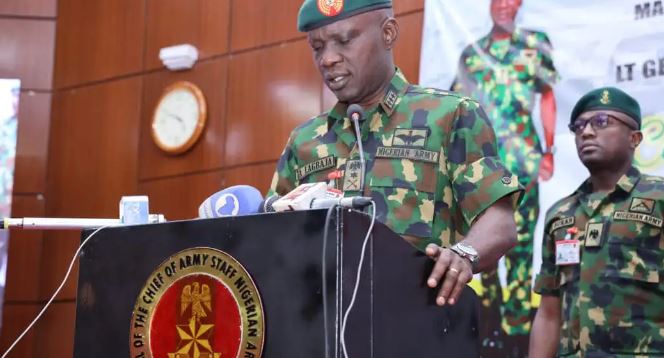Chief of Army Staff, Taoreed Lagbaja, has stated that it is unrealistic for two million security personnel to adequately protect Nigeria’s population of over 200 million people.
Lagbaja made this statement during the 2024 Distinguished Personality Lecture in Ilorin, Kwara State on Wednesday, 25th September.
“In a country of over 200 million people, it is unrealistic to expect security agencies, totalling around two million, including an army of just over 100,000 active personnel without a reserve force, to secure the entire population,” he said.
The army chief, represented by Sanni Mohammed, Chief of Army Training, also touched on Nigeria’s heavy dependence on imported defense equipment, citing the country’s weak industrial base.
“We import over 90 percent of our military needs,” Lagbaja explained, acknowledging that despite local production efforts, Nigeria remains overwhelmingly dependent on foreign military supplies.
Lagbaja complained about the inadequate funding of the Armed Forces of Nigeria (AFN), which he said significantly impacts their operational effectiveness.
“The pursuit of national development alongside national security is a costly endeavour, as defence policy is capital-intensive,” he noted.
The Chief of Army Staff, disclosed that in 2023, the entire AFN had a budget of about $2.8 billion, with an additional supplementary budget of around one billion dollars.
However, not all allocated funds were fully released. He added, “Although funding for the AFN has been improving annually since 2017, the country’s economic downturn has eroded the actual value of what is released. The lack of funding affects the AFN’s equipment holdings, which directly impacts performance.”
On addressing the gap in security personnel, Lagbaja said that the army and other security agencies are under-resourced, making them vulnerable to exploitation by criminal elements.
“The considerable resource gap is being exploited by criminal elements. Addressing this requires investment in expanding and strengthening security forces, ensuring adequate personnel and resources,” he said.
He also emphasized the importance of engaging citizens in national security efforts, stating that, “National security requires all citizens to be part of the security framework, fostering vigilance, trust, and community engagement. This will create a more resilient citizenry, better equipped to respond to national emergencies.”



